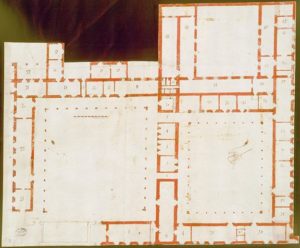“We may prate of the circumstances that lie around us, and even of ourself, but still keep the inmost Me behind its veil. To this extent and within these limits, an author, methinks, may be autobiographical, without violating the reader’s rights or his own.” –Nathaniel Hawthorne, The Scarlet Letter AFTER my aunt died, I was…
Issue: Volume 3, Issue 4

Bianca Premo, Kalyani Ramnath, Sanne Ravensbergen, Laurie Wood, and Yanna Yannakakis: The Everyday Materials of Colonial Legal Spaces
Introduction | Kalyani Ramnath Historians have shown how legal actors in colonized spaces encountered, used, and understood law, shaping everyday legalities. In the reflections that follow, the authors draw attention to the materiality of legal spaces of law and justice; spaces of adjudication such as courtrooms and clerks’ offices, spaces of banishment and confinement such…
Mary Sarah Bilder: The Mind is Like a Bat: Bernard Bailyn and the Debate on the Constitution
After Donald Trump’s election, Bernard Bailyn pondered the relevance of the debate on the Constitution to contemporary politics. As Bailyn wrote, the founders knew how the “debasement of free states” happened. In 2018, he perceived the constitutional system “tested as never before.” The founders worried about “a charismatic demagogue” who would “cut through or ignore…
William E. Nelson: Bernard Bailyn–A Great Teacher and Profound Intellect
Bernard Bailyn was a great teacher and a man of profound intellect and curiosity who was eager even in his nineties to incorporate new material and ideas into his synthesis of the past. I propose to offer two illustrations. The great teacher. When I finished law school in 1965, I knew I wanted to become…
David Konig: Reflections on Bernard Bailyn and Legal History
Bernard Bailyn would probably be as amused as gratified by reflections on any distinction between his impact on Anglo-American legal history and the transforming influence of his other scholarship. The words “law” or “legal” do not appear in the title of any of his published writings and in only one doctoral dissertation before his retirement…
Jack Rakove: Some Thoughts about My Mentor
I wandered into Professor Bailyn’s graduate seminar in the fall of 1969, with little initial interest in early American history. I planned to work on 20th-century history, but Frank Freidel, a great New Deal historian, suggested that I take Bailyn’s seminar instead. It was the best academic advice anyone ever gave me. The reading we…
Sally Hadden: Reflections on Bernard Bailyn
As a doctoral student of Bernard Bailyn’s, I experienced firsthand his laser-like focus and penetrating analysis in every conversation we had, both in seminar and out. Our discussions covered past and present, from the use of spectral evidence in Anne Hutchinson’s Antinomian trial in early Massachusetts to Peter Weir and Australian cinema. Over nearly thirty…
Interview with Alan McPherson: The Ghosts of Sheridan Square
In 2019, Professor Alan McPherson published The Ghosts of Sheridan Square: How a Washington Assassination Brought Pinochet’s Terror State to Justice (Chapel Hill: University of North Carolina Press, 2019), which recounts the history of the 1976 murder of Orlando Letelier, who served as the Chilean Ambassador to the United States under Salvatore Allende. Letelier’s widow…
Ariela Gross: Reflections on Rebecca J. Scott’s “Discerning a Dignitary Offense”
On October 31, 2015, the “March for dignity and against racism” (“Marche pour la dignité et contre le racisme”) was held in Paris to commemorate the uprisings of 2005 against police racism.[1] This is not the way U.S. protests against racism are framed. It is not that we never talk about dignity. Patrisse Cullors, one…
Ryan Reft: What the Library of Congress Manuscripts Can Teach Us About The U.S. Supreme Court
When U.S. District Court judge Gerhard A. Gesell passed away from liver cancer in February 1993, Ruth Bader Ginsburg reached out to his widow, Peggy Gesell, immediately. “I count it my great good fortune to have spent time in his fine company,” the then U.S. Court of Appeals judge wrote. “May you continue in life…

